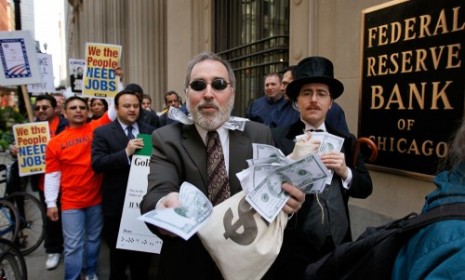Why audit the Fed?
The Federal Reserve handed out more than $2 trillion in secret bailout loans during the global financial crisis. Congress is now demanding to know where the money went

A free daily email with the biggest news stories of the day – and the best features from TheWeek.com
You are now subscribed
Your newsletter sign-up was successful
In response to growing public suspicions that the Federal Reserve played fast and loose in handing out secret bailout loans during the financial crisis, Congress is on the verge of ordering an historically unprecedented audit of the nation's central bank. The White House and Fed chairman Ben Bernanke both oppose the plan, but proponents of the audit point out that the Fed distributed an astounding $2 trillion in bailout loans and taxpayers deserve to know where the money went. (Watch an MSNBC report about the decision to audit the Fed)
Why an audit?
The Federal Reserve — an independent body that sets the nation's monetary policy and oversees the banking system — distributed trillions of dollars in loans to banks to stabilize the nation's financial system after the global real estate bubble burst. To date, the Fed has not disclosed the recipients or amounts of those loans. Particularly on the further reaches of the left and the right, there is a persistent suspicion that banks like Goldman Sachs and Citibank got overly generous treatment.
The Week
Escape your echo chamber. Get the facts behind the news, plus analysis from multiple perspectives.

Sign up for The Week's Free Newsletters
From our morning news briefing to a weekly Good News Newsletter, get the best of The Week delivered directly to your inbox.
From our morning news briefing to a weekly Good News Newsletter, get the best of The Week delivered directly to your inbox.
What will the audit entail?
The Senate this week passed an amendment authorizing a one-time audit of the Federal Reserve's loans to banks and financial institutions during the financial crisis — that is, from Dec 1, 2007 until the present day. "For the first time, the American people will know exactly who received over $2 trillion in zero- or virtually zero-interest loans from the Fed and they will know the exact terms of those financial arrangements," said Senator Bernie Sanders (I-VT), the author of the bill.
Who will be doing the auditing?
The Government Accountability Office, a congressional agency which acts as a watchdog on the spending of public funds. Sometimes known as the 'Taxpayers Friend,' the office has recently investigated ACORN, NASA and the Pentagon.
A free daily email with the biggest news stories of the day – and the best features from TheWeek.com
Will the results be made public?
Yes. The Fed will post on its website all recipients of bailout money from the government and how much they got on December 1, if the bill passes.
Won't that be quite controversial?
It certainly could be. Regardless, the results will be interesting, says David Lightman in the L.A. Times, to see how much government help Goldman Sachs received in the wake of the SEC's fraud allegations against them. There might also be conflicts of interest. For example, directors of the Federal Reserve Bank of New York are commonly executives of the directors of banks that received bailout money.
Did both Democrats and Republicans support it?
Yes. The audit of the Fed had astonishing bipartisan support. Not only did the Senate amendment pass unanimously, but the House version of the bill — which included an even stricter proposal mandating an ongoing audit of the Fed's activities — was a collaborative effort by arch-conservative Ron Paul (R-TX) and ultra-liberal Alan Grayson (D-FL).
Why did the White House oppose it?
The Fed was created as independent body to insulate it from the pressures and vagaries of the political system. Too much transparency might undermine its effectiveness, say critics, by politicizing decisions that should be made on an economic basis alone. "It is important that the Federal Reserve board have independence," said Neal Wolin, deputy secretary of the US Treasury. "We think that countries that have had... the perception of political influence in their central banks have had real problems."
Sources: The New York Times, L.A. Times, Reuters, Huffington Post (2)